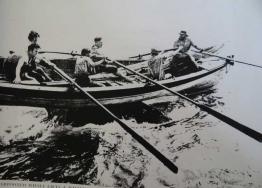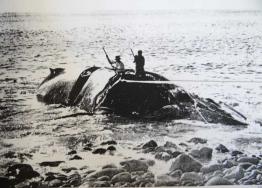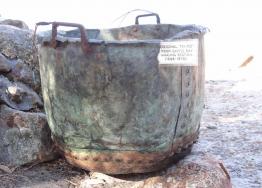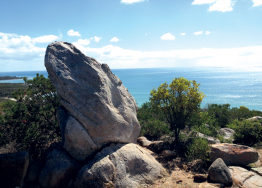Images provided by: Butter Factory Museum
Whaling (the hunting of whales for products such as meat, bone, blubber and oil) was one of the first industries established by the Swan River Colony. Many of the ships which brought convicts to Western Australia were whaling boats, and whaling operations were resumed for the return voyage. Castle Bay was a favourite anchorage for whalers as it provided shelter, water, firewood and elevated granite rocks from which to spot whales. The two main species of whales targeted by whalers at Castle Bay were the Humpback Whale (Megaptera novaeangliae) and the Southern Right Whale (Eubalaena australis). These species migrate north-south along the Western Australian coastline stopping in Geographe Bay to feed and strengthen their calves before continuing to the Southern Ocean.
In 1845 John Bateman formed the Castle Bay Whaling Company with three other Fremantle businessmen. A whaling station called ‘The Fishery’ was set up at the Bay to process the whales to extract whale oil. Harpooned whales were brought ashore and whale oil was obtained by boiling their blubber in huge cauldrons stirred with long handled spoons. The oil was then poured into casks for shipping. A cairn now marks the original site. The ‘whale lookout’ on the hill above Castle Rock was used to sight whales swimming past and quandong trees were seeded there at that time.
In 1872 the Castle Bay Whaling Company closed down as the price of whale oil declined with the commercial development of petroleum. In 1949 there were thoughts about re-opening the whaling industry and Cape Naturaliste lighthouse keepers were asked to count any whale sightings. Only 400 whales were seen from July to November, so the idea was dropped. These numbers were a reflection of the international decline of these whale species following more than 150 years of whaling and soon afterwards the International Whaling Commission banned commercial humpback whaling.
Today we are able to enjoy the beauty of hundreds of whales on their north-south migration along the coast.
For more information on the Castle Bay Whaling Company contact the Busselton Museum.




